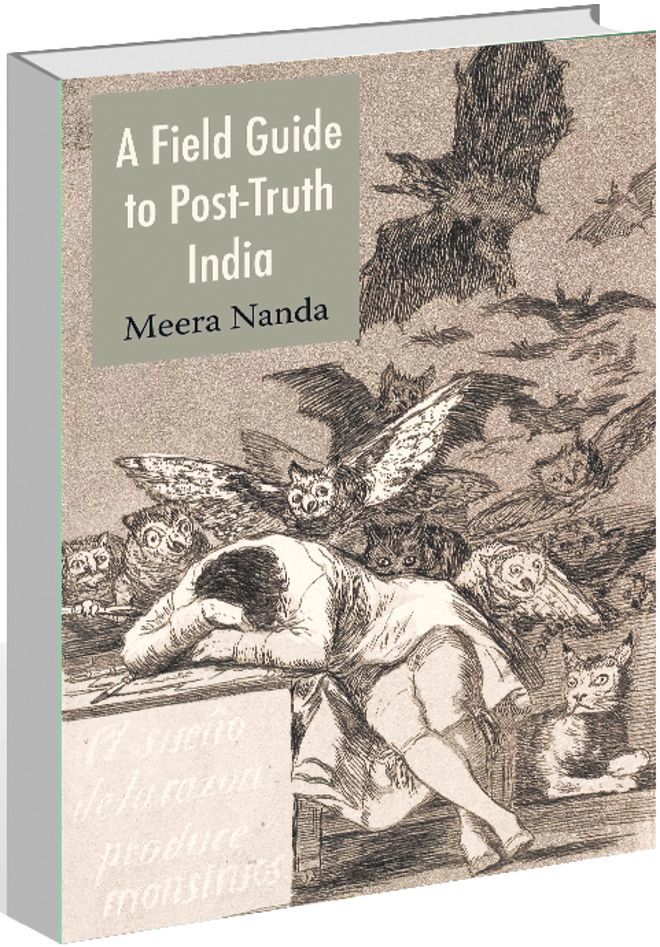Lallan Baghel
Meera Nanda’s ‘A Field Guide to Post-Truth India’ is a fascinating book that touches upon a critically important theme — the existing crisis of truth, science and knowledge and its newer manifestations in the form of post-truth culture. The book deliberates on the emerging crisis for a post-secular India, where the newer canons of ‘Indian Knowledge System’ are being presented as a process of decolonisation and new ways of attaining freedom from the hegemonic discourses of the ‘Western Knowledge System’.
Nanda, a prominent academic and historian of science, offers a layered and nuanced critique of the changing contours of Indian thought. She states that ‘the central thesis of the book is that a post-secular India will be a post-truth India’. She lays bare the contemporary processes of post-truth making where myths are presented as a substitute for history, pseudoscience as science and mysticism as a legitimate tool of attaining scientific method and objective knowledge. Nanda’s analysis filters down into a succinct argument, which shows how the repackaging of these ideas is being presented as a form of decolonisation of the Indian mind to restore the ‘Indian Knowledge System’. She has critically examined the various facets of the emerging post-truth culture in India; for instance, the assault on secularism, science and scientific worldview and the making of a ‘Hindu’ public sphere.
According to Nanda, once upon a time, the cultivation of scientific temper and a critical sense of inquiry was a fundamental duty of every citizen of the Indian republic. This critical rationality, especially through the educational curriculum, is now being rapidly replaced by a ‘Hindu temper’, supported by an outdated metaphysics presented to public in the ‘Indian Knowledge System’.
The author catalogues the landscape of post-truth India in two important categories. In the first and the last chapters of the book — ‘Big Lies and Deep Lies in Post-Truth India’ and ‘Yogic Perception and Hindu Sciences, From Early Beginnings to Our Troubled Times’ — it is examined how discourses on the epistemological crisis are constructed by ‘the intellectuals themselves, marching under the banner of social constructivism, post-colonialism and other fashionable theories of knowledge-as-a-power-game, who have led the assault on the very idea of objective truth’.
Here, the author unpacks the discourses on ‘big lies’ and ‘deep lies’ from a comparative framework of the United States under Trump and India under Modi, which she considers as a paradigm shift in post-secular India. The chapters explain how an epistemological crisis creates the pathways of post-truth culture, where knowledge is not considered as justified true belief; rather, it becomes subjective and a subject of cultural production.
The second theme of the book is addressed in chapters 2, 3 and 4. ‘Defending Tradition and Defying Science: Ayurveda in the Times of Covid-19’, ‘The Dark Age of the Unicorn: Searching for Indigenous Aryans’, and ‘India’s Long Goodbye to Darwin’ address questions of pseudoscience and mysticism. Here, the author has looked at the critical efficacy of Ayurvedic medicine and its different variants at the time of the pandemic.
She also critiques the model of the IIT-Kharagpur Calendar, whose theme is ‘Recovery of Indian Knowledge System’. Another interesting argument is made regarding the compromise faced by an objective understanding of history through the removal of Darwinian understanding from the educational curriculum of NCERT textbooks.
Over the decades, Meera Nanda has contributed to the creation of a counter critical public to understand the importance of science, objective truth and constitutional democracy. This is a highly recommended book for anyone who wishes to understand the making of post-truth culture in the post-secular public sphere of India.
Unlock Exclusive Insights with The Tribune Premium
Take your experience further with Premium access.
Thought-provoking Opinions, Expert Analysis, In-depth Insights and other Member Only Benefits
Already a Member? Sign In Now










